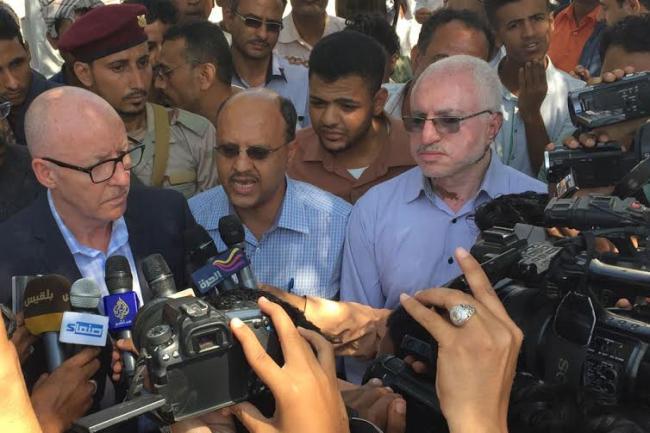Just Earth News/IBNS 26 Jan 2016

Photo: OCHA/Trond Jensen
According to the agency, a 12-truck convoy entered the besieged areas of Al Qahira and Al Mudhafer districts on Thursday carrying 3,000 family food rations – each ration enough to feed a family of six for one month. The food includes vegetable oil, wheat, pulses and sugar.
The convoy entered these areas following extensive negotiations to allow the WFP to deliver life-saving assistance to thousands of hungry people in desperate need.
The breakthrough delivery coincided with a joint UN mission to Ibb, northeast of Taiz city, where UN humanitarian officials met local representatives and witnessed the safe arrival of humanitarian assistance.
Speaking to the press from the capital, Sana’a, after returning from the two areas, the UN Humanitarian Coordinator for Yemen, Jamie McGoldrick said: “I witnessed the impact of conflict, particularly on civilian infrastructure and saw the difficulties people are facing […] I appeal to authorities and groups to work with the United Nations to establish a mechanism that will allow regular and sustained access of these goods and more into the city of Taiz.”
WFP has been delivering food assistance to parts of Taiz city since December 2015 with the hope of reaching as many people in need as possible on the frontlines and inside besieged areas. But, with fighting and blockades, it has been difficult to move food to all districts there.
Taiz is one of 10 governorates – out of Yemen’s 22 governorates – in the grip of severe food insecurity at ‘Emergency’ level – one step below famine on the five-point Integrated Food Security Phase Classification scale. At least one in five households in the area do not have enough food to lead a healthy life, have lost their livelihoods and are facing life-threatening rates of acute malnutrition.
WFP continued to appeal for regular and safe passage of food to all civilians in need across Yemen.
The conflict has worsened Yemen’s already poor food security, adding more than 3 million people to the ranks of the hungry in less than a year, WFP said. According to the UN’s 2016 Humanitarian Needs Overview, 7.6 million people in Yemen are severely food insecure – a level of need that requires urgent, external, food assistance.